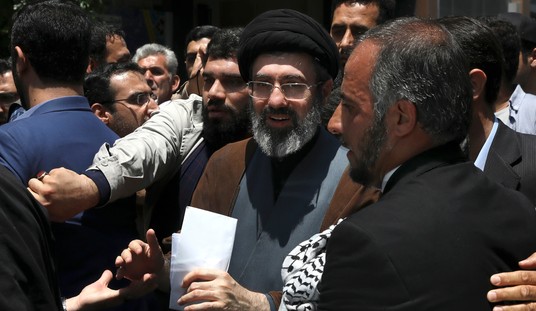If Nouri al-Maliki wanted to dissolve the Iraqi union purposefully, he could hardly be doing a better job. While Kurds fight ISIS in the north — and more effectively than Maliki’s politically purged army has — Maliki accused them of being in league with the extremists even as Kurds mull over whether to just go on their own. Now they want Maliki out, or they’ll be leaving for good:
Iraq’s Kurds said Thursday Prime Minister Nuri al-Maliki was “hysterical” and not fit to run the country, further dimming the prospect of a new leadership uniting to face jihadist fighters.
The worsening political discord comes three days ahead of a planned parliamentary session meant to revive the process of replacing what has effectively been a caretaker government since April elections.
Maliki “has become hysterical and has lost his balance”, a statement from the office of Kurdish regional president Massud Barzani said, reacting to accusations by the prime minister a day earlier that his administration was harbouring militants.
The Kurdish delegation in Iraq’s parliament has walked out, as have Kurdish ministers in Maliki’s government. That prompted Maliki to retaliate, albeit impotently:
A dispute between Iraq’s Shiite-led central government and the semi-autonomous Kurdish region is boiling over, as Kurdish ministers withdrew from all cabinet meetings. In response, Baghdad is reportedly halting some cargo flights between Kurdish cities.
The spat is playing out under the threat of the extremist Sunni group the Islamist State, which has taken over cities and territories in northern and western Iraq. …
The Kurdish part of Iraq is becoming ever more remote from the government in Baghdad. On Wednesday, Prime Minister Nouri al-Maliki accused Kurds of sheltering terrorists and Saddam Hussein loyalists. In response, a Kurdish politician, Roz Nouri Shawesm, called Maliki hysterical and said he must step down.
“Kurdish ministers will no longer attend cabinet meetings. Kurdish fighters have taken advantage of the chaos engulfing Iraq to seize territory to which they have long laid claim, including the oil-rich city of Kirkuk.
For one, Kurds have their own independent lines of communication when it comes to air travel and cargo. They’ve been handling that themselves since the 1991 war, which gave them long-awaited autonomy from Saddam Hussein after decades of genocide and oppression. They can get their own supplies, and with their suddenly improved relations with Turkey, may have more robust options than Baghdad does on trade.
Plus, the Kurds have their own oil revenue — and they’ve added a couple of new fields to that stock today:
Iraqi Kurds have taken over two oil fields amid a growing dispute with the government in Baghdad, Iraqi and Kurdish sources say.
Kurdish peshmerga forces seized control of production facilities at the Bai Hassan and Kirkuk oil fields in the north of the country on Friday.
Maliki’s government demanded that the Peshmerga return the fields to Iraqi control, but the Kurds say Baghdad was about to “sabotage” the facilities:
In a statement on Friday, the Iraqi oil ministry condemned the seizure of oil refineries, adding that they expected Kurdish fighters to “support security forces in confronting terrorist groups rather than using the conditions to raid and occupy oil fields”.
Reuters news agency said a senior source within the Kurdistan Regional Government had confirmed the takeover.
The unnamed source said they had been “forced to act to protect Iraq’s infrastructure after learning of attempts by Iraq oil ministry officials to sabotage it”.
Global Post‘s Jean MacKenzie, writing at The Week, advises that the world should just let Iraq partition itself:
While the Iraqi army is much larger and better-equipped than ISIS and its affiliates, it has had limited success in dislodging the insurgents from other areas it has seized. Fallujah and Ramadi have been under ISIS control since January.
Steven Simon, a senior fellow at The Middle East Institute in Washington, DC, agrees that it may be too much to hope that ISIS can be defeated.
“ISIS is deeply rooted in western Iraq,” he said. “They also have safe havens on the other side of the rather blurred border [with Syria].”
The Kurds in the north, who have seized territory and become all but independent over the past two weeks, will not give up their gains, Mendelsohn insisted, and putting the country back together may be nearly impossible.
“We are looking at de facto partition,” said Mendelsohn.
Maliki had a chance to keep this from happening after the 2007 surge, and the US its chance to stick around and apply pressure to push Maliki in that direction. Those chances are gone now, and not even a US intervention in force is likely to revive them. Maliki’s actions in this crisis show that he has no interest in unity under a federalist, shared-power system, and as long as Maliki’s in charge the Kurds and the Sunnis will have no incentive to stick around. Get ready for the sectarian bloodbath to come, and the best the West will probably be able to do is to contain it to Iraq and Syria while promoting democracy in the new, independent Kurdistan.








Join the conversation as a VIP Member